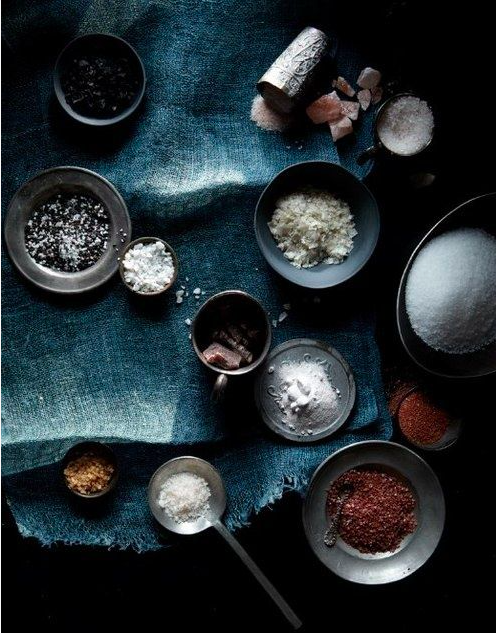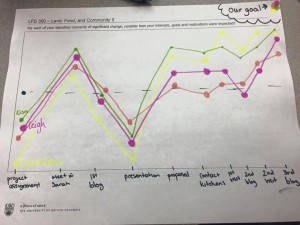Blog Post 4 – Working with the data
 Weekly Objectives and Achievements
Weekly Objectives and Achievements
√ Successfully completed 4 Community Kitchen visits with completed survey and data for the City of Vancouver
√ Weekly group meeting
√ Create a tentative schedule for group meetings and project deadlines
χ It was our intention to find another community kitchen within our area to visit, but kitchens that were contacted were not interested in participating in our project.
Analyze data collected from community kitchen visits
Identify overarching themes between community kitchens in our assigned areas
– What are their similarities and differences?
– Are there any common successes or barriers?
– What are our recommendations for these community kitchens?
Organize data into table format
Assign group members tasks for completing final project
The last two weeks have been a great opportunity for our group to reflect on the work we’ve done, and establish a strategy to complete the project in an effective way. Our group is feeling ‘recharged’ and hopeful of creating a report with recommendations and suggestions that is impactful of our community partners – both the community kitchens and City of Vancouver.
During our tutorial session, our group identified as meeting with Sarah as a moment of significant change. This moment was significant because when we were assigned our project, our group felt disappointed because we didn’t receive our top choices and the project description had left us with a lot of uncertainty of what we would be working on. Sarah’s presentation gave us clarity on the project and how it would be contributing to Vancouver’s Food Strategy.
Our group felt that our perceptions and assumptions of community kitchens changed after Sarah’s presentation. The variety that community kitchens embody and the fact there is so much more to learn about community kitchens was exciting. We related that community kitchens are a small part of Vancouver’s Food Strategy but play an important role in positively impacting participant’s relationship with food and nutrition. We felt that CK’s could relate to Ron Finley’s work as the ‘Guerilla Gardener in South Central LA’ building accessible, volunteer-based, community gardens in LA with a ‘pay it forward’ mentality. At surface, his work may be small, only directly impacting a marginal percentage of the population, but he hopes to inspire others to combat larger problems such as food insecurity and obesity.
“Food is the problem and the solution” (Finley, 2013). Community kitchens we surveyed had faced food related problems and address these issues through programs for their participants. Food problems is a large category that encompass so many different aspects of our food system, and community kitchens have the opportunity to focus on a niche part that may contribute to the bigger picture.
Moving forward with our project, our group took inspiration from ‘The Global Food Waste Scandal’ a TED Talk by Tristram Stuart, when considering recommendations for community kitchens. Reducing food waste is a priority action for the Vancouver Food Strategy. Tristram Stuart discusses food waste at the retail and industry level that contribute to a majority of global waste. Community kitchens have the ability to combat this food problem, if retailers donated or heavily discounted food close to spoilage community kitchens could prepare and distribute the food to those in need. A similar model was adopted in France, where it is now the law to donate their food ‘waste’. The City of Vancouver’s Food Strategy could explore this option for reducing food waste while improving food access.
The Graceful Dismount
Our group’s strategy for successfully completing our project was discussed at our last meeting. We assigned roles to each group member and created expectations of the work for which they are responsible. We have a mutual understanding that each group member should follow the assignment rubric, communicate with other group members during project work, be open to feedback, and complete tasks on agreed deadlines. Our plan of action is to
- Complete data table
- Assess trends – successes and barriers shared between community kitchens
- Compare data from our neighborhoods to the other groups conducting the same project
- Complete systems diagram
- Follow assignment rubric and instructions, and incorporate feedback from Sarah and Adrienne
- Follow our group deadlines for portions of the project
- Meet weekly to review progress and discuss changes if needed
Work Cited
Ron Finley. (February 2013). Ron Finley: A Guerilla Gardener in South Central LA. Retrieved from http://www.ted.com/talks/ron_finley_a_guerilla_gardener_in_south_central_la?language=en
Stuart Tristram. ( May 2012) Tristram Stuart: The Global Food Waste Scandal. Retrieved from http://www.ted.com/talks/tristram_stuart_the_global_food_waste_scandal?language=en



